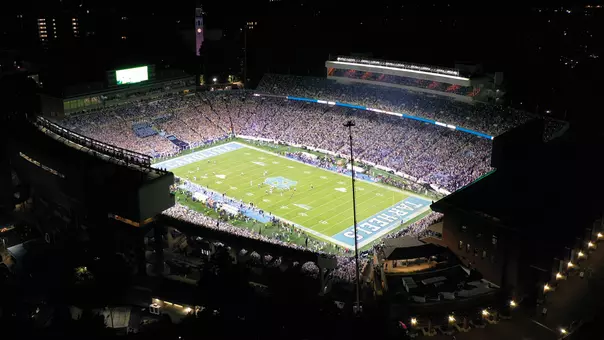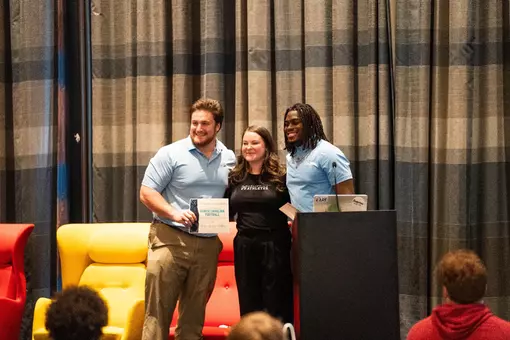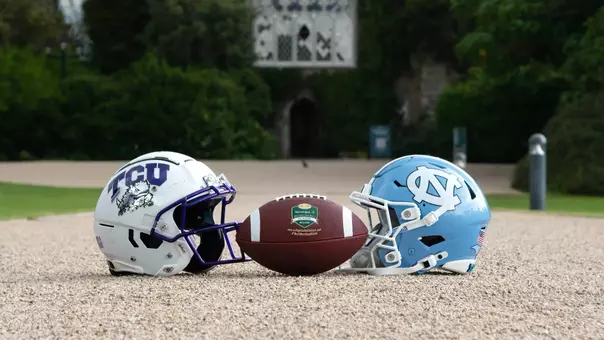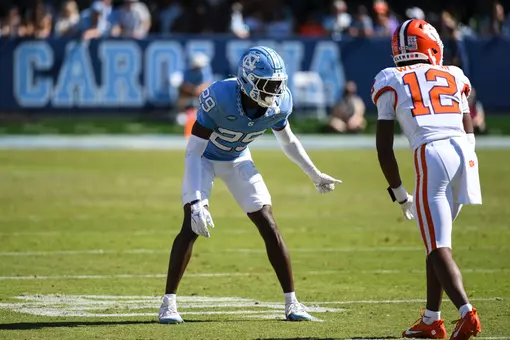University of North Carolina Athletics
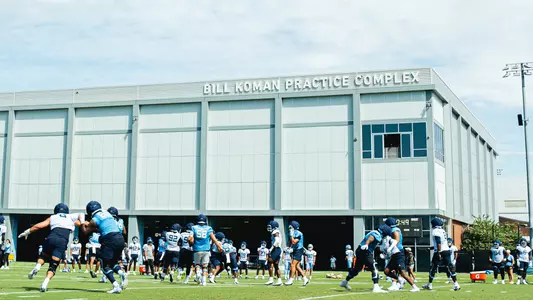
Extra Points: The Koman Way
September 19, 2025 | Football
When the ACC Network football crew went live with Bill Belichick from the Carolina football practice facility one morning in August on their preseason tour, the Tar Heel coach was quick to give credit to the namesake of the facility and a man who held a special tie to the Belichick family.
"It's great to have you here in the Bill Koman facility, it's a special place," Belichick said. "My dad coached Bill for the three years he was here, and of course his son Jim is a big supporter. We're really proud of the support the Koman family has given us. My dad and Bill had a special connection."
Jim Koman remembers his dad saying over the years how much he had liked Steve Belichick and that Bill Koman had fun watching Bill Belichick's coaching star rise over the years and reflect back on those Chapel Hill days from the mid-1950s.
"Little Bill had the run of the football stadium and the field house when he was a boy," Jim says. "Dad was the one who'd corral him and hold him on his lap while they were watching film. I've got an old picture somewhere of Dad, Steve and little Bill, maybe a couple other guys. I'll keep looking."
Belichick reflects on his days growing up and watching Sunday NFL football with his dad Steve, whose college coaching career included stints at Vanderbilt and Carolina before settling in Annapolis and coaching the Naval Academy for four decades-plus.
"Whenever we watched pro football, there were two players we watched—Bill Koman and Bill Wade," Belichick says. "Dad coached Wade at Vanderbilt, and he went on to play for George Halas and the Bears. Then here at Carolina, he coached Koman, so we followed him with the Cardinals. Those were his two college guys. I remember those Cardinals teams. They had Koman and guys like Jim Hart, Jackie Smith, Pat Fisher. They were a good team. They were fun to watch."
The Cardinals certainly were from 1959-67 with Koman leading the defense from his linebacker position. He brought to the playing field the same tenacity and courage he'd needed growing up in the coal-and-iron country of the Beaver Valley in western Pennsylvania.
Growing up in Ambridge, Koman at 10 years of age suffered a serious infection on the back of one leg after a bicycle accident, and doctors were considering amputation until they decided to administer a new drug called Penicillin. That saved his leg, but the three months convalescence stunted his growth and left young Koman smaller and wirier than many kids his age, and he had 50 percent less mobility in the affected limb. He overheard his father saying the boy would never play sports again.
"I'll never forget the agonizing look on my father's face when a man sympathized with him for having a crippled son who couldn't be an athlete," Koman said.
"My dad took that to heart and so from that point forward, he got up every morning at 5 a.m. and ran with that bad leg," says Jim. "Six miles out and six miles back every day to strengthen that leg. He did leg lifts and everything else that he could possibly think of."
Koman was a trumpet player in the band at Hopewell High until he was healthy enough to play football as a junior. He became a star athlete and drew the attention of Carolina coach George Barclay, who invited Koman south for a recruiting trip. He was sold on Chapel Hill when he saw 20 flavors of ice cream in the athletic dining hall and was told he could eat all he wanted every night.
As a freshman in 1952 on his first snap of college football practice, Koman had his nose broken.
On the second snap, blood everywhere, he pancaked a nose guard onto his rear end.
Koman was given a varsity gear the next day.
From there Koman embraced the athletic, academic and social experiences at Carolina, during the fall having games as a guard on the defensive line like notching 35 tackles in a 1955 loss to Oklahoma. One local paper dubbed him "a tower of strength" after that performance. He was good on the hardwood as well, spending the summers playing basketball with the 1957 national title Tar Heels at camps in the Catskills.
Koman earned a degree in economics in 1956 and was drafted in the eighth round of the NFL draft by the Baltimore Colts. He, Johnny Unitas and Lenny Moore were the only rookies to make the Colts roster that season. After one year, he was traded to Philadelphia, where he played two years, then was dealt to the Cardinals (two years in Chicago and then the franchise moved to St. Louis).
There was one stretch where he played 120 straight games, with one writer dubbing him the "NFL's ironman of the 1960s." Koman was named to the Pro Bowl in 1962 and '64.
"This is a tough man's game, and I'm as tough as anyone out there," Koman said matter-of-factly.
Upon retiring from football in 1968, he ventured into commercial real estate, beginning with building apartments in college towns across the country. As founder of The Koman Group, he built both commercial and residential projects across the St. Louis metropolitan area. He was one of the original five founding members of the Casino Queen ownership group. The casino would prove to be an economic boon to East St. Louis and stabilize its economy for decades.
That business success allowed him to give generously back to the university he loved so much, and today you can find the Koman name prominently displayed in two locations in the middle of the Chapel Hill campus.
There's a sign amidst the pine trees along Stadium Drive identifying a brick path as Koman Way. The path leads from the road to the Stallings-Evans Sports Medicine Center, which opened in the spring of 2010. The facility cost $8.3 million, with Koman donating $1 million of the tab.
Then 300 yards to the east is the football practice facility, with the designation Bill Koman Practice Complex emblazoned across the upper reaches of the indoor facility that opened in 2018.
Koman died Nov. 1, 2019, at his home in St. Louis at age 85, and Jim (Carolina 1986) and wife Jennifer within a year made a significant gift to honor Bill—$15 million to support a new Carolina football initiative for student-athletes' lifelong success and to name the new practice complex. The Bill Koman Game Plan for Success is a comprehensive development program that helps prepare Carolina football players for life after graduation.
"Dad just loved Chapel Hill, he loved everything about it," Jim says. "He enjoyed everything from the weather to getting out there on the beach the little time he had to do that. It was something really special."
For his 80th birthday in 2014, Bill visited Chapel Hill for the season-opener against Liberty, with his entire family attending.
"Dad is blue and blue throughout, he doesn't miss a game," Jim said at the time of his dad's finding a broadcast outlet for Tar Heel football and basketball games from his home in St. Louis. "He takes a lot of pride in what Carolina did for him, giving him the start in life by giving him the scholarship and a great, great, great education. He went from Chapel Hill and was able to apply those skills to the rest of his life."
Chapel Hill writer Lee Pace (Carolina '79) has been writing about Tar Heel football under the "Extra Points" banner since 1990 and reporting from the sidelines on radio broadcasts since 2004. Write him at leepace7@gmail.com and follow him @LeePaceTweet.
"It's great to have you here in the Bill Koman facility, it's a special place," Belichick said. "My dad coached Bill for the three years he was here, and of course his son Jim is a big supporter. We're really proud of the support the Koman family has given us. My dad and Bill had a special connection."
Jim Koman remembers his dad saying over the years how much he had liked Steve Belichick and that Bill Koman had fun watching Bill Belichick's coaching star rise over the years and reflect back on those Chapel Hill days from the mid-1950s.
"Little Bill had the run of the football stadium and the field house when he was a boy," Jim says. "Dad was the one who'd corral him and hold him on his lap while they were watching film. I've got an old picture somewhere of Dad, Steve and little Bill, maybe a couple other guys. I'll keep looking."
Belichick reflects on his days growing up and watching Sunday NFL football with his dad Steve, whose college coaching career included stints at Vanderbilt and Carolina before settling in Annapolis and coaching the Naval Academy for four decades-plus.
"Whenever we watched pro football, there were two players we watched—Bill Koman and Bill Wade," Belichick says. "Dad coached Wade at Vanderbilt, and he went on to play for George Halas and the Bears. Then here at Carolina, he coached Koman, so we followed him with the Cardinals. Those were his two college guys. I remember those Cardinals teams. They had Koman and guys like Jim Hart, Jackie Smith, Pat Fisher. They were a good team. They were fun to watch."
The Cardinals certainly were from 1959-67 with Koman leading the defense from his linebacker position. He brought to the playing field the same tenacity and courage he'd needed growing up in the coal-and-iron country of the Beaver Valley in western Pennsylvania.
Growing up in Ambridge, Koman at 10 years of age suffered a serious infection on the back of one leg after a bicycle accident, and doctors were considering amputation until they decided to administer a new drug called Penicillin. That saved his leg, but the three months convalescence stunted his growth and left young Koman smaller and wirier than many kids his age, and he had 50 percent less mobility in the affected limb. He overheard his father saying the boy would never play sports again.
"I'll never forget the agonizing look on my father's face when a man sympathized with him for having a crippled son who couldn't be an athlete," Koman said.
"My dad took that to heart and so from that point forward, he got up every morning at 5 a.m. and ran with that bad leg," says Jim. "Six miles out and six miles back every day to strengthen that leg. He did leg lifts and everything else that he could possibly think of."
Koman was a trumpet player in the band at Hopewell High until he was healthy enough to play football as a junior. He became a star athlete and drew the attention of Carolina coach George Barclay, who invited Koman south for a recruiting trip. He was sold on Chapel Hill when he saw 20 flavors of ice cream in the athletic dining hall and was told he could eat all he wanted every night.
As a freshman in 1952 on his first snap of college football practice, Koman had his nose broken.
On the second snap, blood everywhere, he pancaked a nose guard onto his rear end.
Koman was given a varsity gear the next day.
From there Koman embraced the athletic, academic and social experiences at Carolina, during the fall having games as a guard on the defensive line like notching 35 tackles in a 1955 loss to Oklahoma. One local paper dubbed him "a tower of strength" after that performance. He was good on the hardwood as well, spending the summers playing basketball with the 1957 national title Tar Heels at camps in the Catskills.
Koman earned a degree in economics in 1956 and was drafted in the eighth round of the NFL draft by the Baltimore Colts. He, Johnny Unitas and Lenny Moore were the only rookies to make the Colts roster that season. After one year, he was traded to Philadelphia, where he played two years, then was dealt to the Cardinals (two years in Chicago and then the franchise moved to St. Louis).
There was one stretch where he played 120 straight games, with one writer dubbing him the "NFL's ironman of the 1960s." Koman was named to the Pro Bowl in 1962 and '64.
"This is a tough man's game, and I'm as tough as anyone out there," Koman said matter-of-factly.
Upon retiring from football in 1968, he ventured into commercial real estate, beginning with building apartments in college towns across the country. As founder of The Koman Group, he built both commercial and residential projects across the St. Louis metropolitan area. He was one of the original five founding members of the Casino Queen ownership group. The casino would prove to be an economic boon to East St. Louis and stabilize its economy for decades.
That business success allowed him to give generously back to the university he loved so much, and today you can find the Koman name prominently displayed in two locations in the middle of the Chapel Hill campus.
There's a sign amidst the pine trees along Stadium Drive identifying a brick path as Koman Way. The path leads from the road to the Stallings-Evans Sports Medicine Center, which opened in the spring of 2010. The facility cost $8.3 million, with Koman donating $1 million of the tab.
Then 300 yards to the east is the football practice facility, with the designation Bill Koman Practice Complex emblazoned across the upper reaches of the indoor facility that opened in 2018.
Koman died Nov. 1, 2019, at his home in St. Louis at age 85, and Jim (Carolina 1986) and wife Jennifer within a year made a significant gift to honor Bill—$15 million to support a new Carolina football initiative for student-athletes' lifelong success and to name the new practice complex. The Bill Koman Game Plan for Success is a comprehensive development program that helps prepare Carolina football players for life after graduation.
"Dad just loved Chapel Hill, he loved everything about it," Jim says. "He enjoyed everything from the weather to getting out there on the beach the little time he had to do that. It was something really special."
For his 80th birthday in 2014, Bill visited Chapel Hill for the season-opener against Liberty, with his entire family attending.
"Dad is blue and blue throughout, he doesn't miss a game," Jim said at the time of his dad's finding a broadcast outlet for Tar Heel football and basketball games from his home in St. Louis. "He takes a lot of pride in what Carolina did for him, giving him the start in life by giving him the scholarship and a great, great, great education. He went from Chapel Hill and was able to apply those skills to the rest of his life."
Chapel Hill writer Lee Pace (Carolina '79) has been writing about Tar Heel football under the "Extra Points" banner since 1990 and reporting from the sidelines on radio broadcasts since 2004. Write him at leepace7@gmail.com and follow him @LeePaceTweet.
MBB: Hubert Davis Pre-Duke Press Conference
Thursday, March 05
MBB: Henri Veesaar & Seth Trimble Pre-Duke Press Conference
Thursday, March 05
UNC Women's Lacrosse: Humphrey Fires Tar Heels Past Clemson, 12-9
Thursday, March 05
UNC Softball: Long Ball Propels Heels Over Stetson, 12-4
Thursday, March 05











